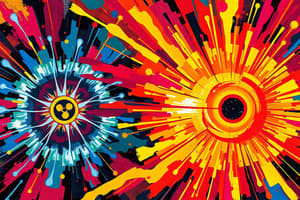Podcast
Questions and Answers
Which equation describes the conversion of mass to energy in nuclear fusion?
Which equation describes the conversion of mass to energy in nuclear fusion?
- E=mc² (correct)
- F=ma
- P=IV
- Q=mcΔT
What state of matter exists during nuclear fusion?
What state of matter exists during nuclear fusion?
- Solid
- Gas
- Plasma (correct)
- Liquid
What happens to the mass of nuclei during nuclear fusion?
What happens to the mass of nuclei during nuclear fusion?
- It is completely converted to plasma
- It remains the same
- It increases
- It is partially converted to energy (correct)
How does the energy released by nuclear fusion compare to that released by burning fossil fuels?
How does the energy released by nuclear fusion compare to that released by burning fossil fuels?
What is the primary characteristic of plasma in the context of fusion?
What is the primary characteristic of plasma in the context of fusion?
What does the term 'society' signify in its Latin roots?
What does the term 'society' signify in its Latin roots?
In what historical context did sociology emerge as an academic discipline?
In what historical context did sociology emerge as an academic discipline?
Who is commonly recognized as the 'Father of Sociology'?
Who is commonly recognized as the 'Father of Sociology'?
What is the main focus of sociology as a discipline?
What is the main focus of sociology as a discipline?
What role do social forces play according to sociology?
What role do social forces play according to sociology?
What is the primary focus of cultural relativism?
What is the primary focus of cultural relativism?
What does the term 'culture' encompass?
What does the term 'culture' encompass?
Who is known as the father of modern American anthropology?
Who is known as the father of modern American anthropology?
What is the significance of traditions in culture?
What is the significance of traditions in culture?
Which subfield of anthropology focuses on the study of language?
Which subfield of anthropology focuses on the study of language?
What aspect of human behavior is highlighted in the concept of social realities?
What aspect of human behavior is highlighted in the concept of social realities?
How do anthropologists typically conduct their studies?
How do anthropologists typically conduct their studies?
What is the main goal of comparison in cultural anthropology?
What is the main goal of comparison in cultural anthropology?
Flashcards are hidden until you start studying
Study Notes
Fusion and Plasma
- Fusion occurs exclusively within the nuclei of atoms.
- At fusion temperatures, matter transitions into plasma, a state where electrons are removed from atoms.
- Plasma is characterized as a high-energy, electrically charged gas.
Energy Conversion
- When atomic nuclei collide, a portion of their mass converts into energy, illustrating Einstein's equation E=mc².
- This mass-energy conversion is a central process in nuclear fusion.
Energy Output
- Nuclear fusion produces a significantly higher energy yield per gram compared to combustion sources.
- Energy released from fusion vastly surpasses that from burning equal amounts of wood, coal, oil, or gasoline.
Culture
- Culture encompasses ideas, customs, arts, and social behaviors of a particular group or society.
- Traditions represent ideas and beliefs passed down through generations, serving as customs to honor cultural identity.
Cultural Relativism
- Cultural relativism emphasizes understanding different convictions and practices from the perspective of the respective culture rather than one's own.
Comparison in Cultural Anthropology
- Cultural anthropology involves comparing ideas, morals, practices, and systems within or between different cultures to gain insight into human behavior.
Social Realities
- Human behavior is motivated by powerful values and beliefs that shape societal interactions.
Anthropology
- Derived from Greek "anthropos" (human) and "logia" (study), anthropology examines the totality of humanity, society, and culture.
- Franz Boas, regarded as the father of modern American anthropology, emphasized the scientific method and rejected biological racism while promoting cultural relativism.
Subfields of Anthropology
- Various branches include:
- Biological or physical anthropology
- Archaeological anthropology
- Cultural anthropology
- Linguistic anthropology
Different Perspectives in Anthropology
- Holism in anthropology reflects an understanding of how various aspects of life are interconnected.
- Fieldwork, or ethnography, involves deep engagement with communities to observe and analyze social practices.
Sociology
- Sociology, rooted in the Latin term "socius" (buddy or companionship), studies individuals who share localities, interact, and connect through culture.
- Emerged during the Industrial Revolution (1750-1850) and became officially recognized as an academic discipline in the early 20th century.
Social Forces
- Social forces significantly influence the behaviors and actions of individuals and institutions within society.
August Comte
- August Comte, a French scholar, is recognized as the "Father of Sociology" for coining the term in 1838 to denote a new perspective on societal study.
Studying That Suits You
Use AI to generate personalized quizzes and flashcards to suit your learning preferences.




